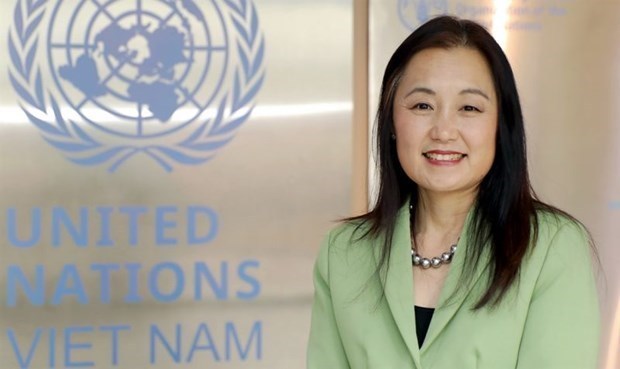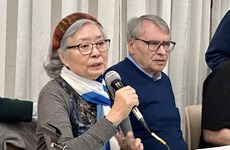Vietnam achieves significant progress in anti-domestic violence work: UNFPA Representative
The draft amended Law on Domestic Violence Prevention and Control is scheduled to be passed by the National Assembly at its year-end session this October.
 United Nations Population Fund (UNFPA) Representative in Vietnam Naomi Kitahara. (Photo: UNFPA)
United Nations Population Fund (UNFPA) Representative in Vietnam Naomi Kitahara. (Photo: UNFPA)On this occasion, United Nations Population Funds (UNFPA) Representative in Vietnam Naomi Kitahara grants Vietnam Law & Legal Forum magazine an interview about Vietnam’s efforts and achievements in domestic violence prevention and control as well as successful anti-domestic violence programmes and models implemented in the country with the coordination and technical support of UNFPA.
Reporter: The National Assembly of Vietnam passed the country’s first-ever Law on Domestic Violence Prevention and Control in 2007. This was a legislative milestone making Vietnam become one of the first countries to formulate a law governing domestic violence issues in adherence to the principle and observance of human rights for all without distinction as to race, sex, language, or religion set out in the Charter of the United Nations, demonstrating Vietnam’s strong commitment to implementing treaties as well as the country’s anti-domestic violence efforts. Could you give some comments on the results of domestic violence prevention and control in Vietnam after more than 10 years of implementing the Law on Domestic Violence Prevention and Control and other related documents?
UNFPA Representative for Vietnam Naomi Kitahara: Vietnam’s approval of the Law on Domestic Violence Prevention and Control in 2007 clearly showed the country’s strong commitment and remarkable efforts in addressing domestic violence. The Law has created a solid legal framework for the implementation of many policies and interventions in addressing domestic violence at the central and grassroots levels in the last two decades.
In 2016, UNFPA provided technical and financial support to the Ministry of Culture, Sports and Tourism (MOCST) to conduct an independent review of the 10-year implementation of the 2007 Law on Domestic Violence Prevention and Control. The review closely looked at the areas of the Law enforcement by relevant stakeholders, and the consistency of the Law with treaties and other related laws and policies in Vietnam.
The review showed that the Government had developed an extensive legal and policy framework and action plans to tackle domestic violence prevention and control. Under the Law, five Decrees[1] and two National Programs of Action on domestic violence prevention and control were developed and approved by the Government.
In addition, significant progress in prevention and control of domestic violence has been achieved, including mass communication campaigns to raise public awareness, the provision of immediate protection of survivors of violence, and the collection of data and statistics. The Government’s strong commitment to addressing domestic violence has also been reflected in the endorsement of the Prime Minister’s Decisions to organize the national annual action month on domestic violence prevention and control in June, as well as the action month on gender equality and gender-based violence from 15 November to 15 December every year.
The 2007 Law set out the duties and responsibilities of more than 17 institutions, mass organizations, community-based organizations and individuals in domestic violence prevention and response to victims and perpetrators. However, as there remain significant challenges in the coordination of domestic violence prevention and control activities, the independent review highlighted the need for a better coordination mechanism in addressing domestic violence. In May 2016, the Prime Minister issued the Decision on the coordination mechanism among related government’s ministries and agencies, institutions and organizations at the central and local levels in domestic violence prevention and control.
Reporter: Vietnamese legislators are putting the final touch on and expected to pass the draft amended Law on Domestic Violence Prevention and Control at the fourth session of the 15th National Assembly this October. Noteworthily, the Law is revised toward strengthening measures for protecting human rights under the 2013 Constitution. With this approach, in your opinions, what positive changes can we expect to see in the amended Law on Domestic Violence Prevention and Control as well as its consistence with international commitments and laws?
UNFPA Representative for Vietnam Naomi Kitahara: UNFPA has supported MOCST to revise the 2007 Law and to advocate for the application of the human rights based, and domestic violence survivor-centered approach. For instance:
Measures for contact prohibition orders have been clearly spelled out to strengthen the protection of survivors of violence.
Reconciliation is now optional, and no longer mandatory, as it has not really prevented violence from escalating.
Domestic violence will be penalized in accordance of the Criminal Code as part of strengthening the justice system for domestic violence.
All service providers to survivors of violence must be properly trained so as to avoid re-victimization of victims.
State budgets as well as funds from the international community must be made available to fully address domestic violence.
Integrated and essential services must be provided for survivors of violence, with a promotion of the One-Stop Service Center (OSSC) approach. The Law also calls for partnerships with mass and community-based organizations, including provisions of budgets.
These are just some of the examples that the revised Law will positively bring about, and MOCST and the National Assembly must be congratulated for such a participatory and consultative process undertaken for years towards developing a national consensus in addressing domestic violence. Every comment and input submitted, and every opinion and option has been given serious consideration to be reflected in the revised Law.
Reporter: In addition to legislative efforts, what do you think about other activities to prevent domestic violence, especially during the COVID-19 pandemic and post-COVID 19 socio-economic recovery period?
UNFPA Representative for Vietnam Naomi Kitahara: All of us went through a very difficult period with COVID-19, and Vietnam was not an exception. But it is important to highlight that across different countries, the pre-existing prevalence of violence against women and girls was exacerbated in the context of Covid-19. We saw the trend in Vietnam too, and the number of calls for help in UNFPA-supported hotlines and helplines doubled both during the COVID-19 pandemic as well as in the post-pandemic period, indicating that a lot more women have been at risk of violence.
One of UNFPA’s interventions to address domestic and gender-based violence is the introduction and development of the OSSC model, also known as “Anh Duong House” (Sunshine House), which aims at supporting victims of violence.
Anh Duong House provides essential, comprehensive, and integrated services to women and girls who are experiencing and/or at risk of gender-based and domestic violence. It provides a wide range of services, meeting international standards, including health care, psychological support, counseling, social welfare services, emergency shelters, police protection, legal and justice services, and referrals. Anh Duong House’s 24/7 toll-free hotline is receiving more than 1,000 calls a month per center, which is already beyond the original capacity. Therefore, additional centers were called for to help more survivors of violence. All services provided at the OSSC are based on the survivor-centered principle, in which survivors are treated with respect and dignity, and assured of privacy and confidentiality. For the time being, four Anh Duong Houses have been launched in four different locations, namely Quang Ninh, Thanh Hoa, Da Nang and Ho Chi Minh City. We plan to launch four more under UNFPA’s funding in coming years.
During the pandemic period, UNFPA also distributed our signature product “Dignity Kits,” which include essential items to preserve women’s dignity, hygiene, and wellbeing, and the kits contain, in a discreet manner, key information on gender-based and domestic violence. In partnership with Australia, Japan, the Republic of Korea, and the Vietnam Farmer’s Union, UNFPA distributed more than 34,000 “Dignity Kits” to women and girls in the areas heavily impacted not only during COVID-19 pandemic but also in emergency situations, such as floods, typhoons and landslides, to protect them from domestic and gender-based violence.
Additionally, we see the potential in digital transformation to cover as many women and girls as possible, and we introduced innovative technological platforms to disseminate information on the risks of domestic violence and other support services. Such platforms as social networks, a chatbox, SMS text messages, online galleries, and LED screens helped us reach out to the population groups who are left furthest behind.
Reporter: For the past years, Vietnam has actively coordinated with international partners, including UNFPA, in preventing domestic violence. Will you highlight some of your programs implemented in Vietnam to tackle gender-based violence?
UNFPA Representative for Vietnam Naomi Kitahara: Ending gender-based violence and harmful practices against women and girls is one of the three transformative agenda of UNFPA’s corporate Strategic Plan. In Vietnam, UNFPA has been accompanying the Government of Vietnam in the path to ending violence against women and girls. UNFPA wants to ensure that all women and girls in Vietnam, including those most vulnerable, have the right to live a life free of violence and with dignity. To achieve this goal, UNFPA has partners with many development partners and international and national organisations.
Among others, UNFPA partnered with the Government of Australia to conduct the national study on violence against women in Vietnam. From time to time, we encounter people who do not necessarily believe how prevalent domestic violence is in Vietnam. The Study, which was carried out by Vietnam’s General Statistics Office and MOLISA, provided clear evidence and data with regard to the prevalence of domestic violence in Vietnam. Also UNFPA partnered with Korea International Cooperation Agency (KOICA) to implement three national communications campaigns and establish Vietnam’s very first OSSC, Anh Duong House, in Quang Ninh province. This model has been subsequently replicated in Thanh Hoa, Da Nang and Ho Chi Minh City with funding from the Government of Japan.
Currently, UNFPA in collaboration with UNICEF and UN Women, implements a project funded by the Government of Australia to support the Government of Vietnam to address violence against women and children. Under this project in the period of 2021 - 2025, four more Anh Duong Houses will be developed while more interventions will be introduced to strengthen the country’s legal system, implement innovative communications for behavioral change, and strengthen the capacity of various stakeholders to have a shared approach in addressing domestic and gender-based violence./.













